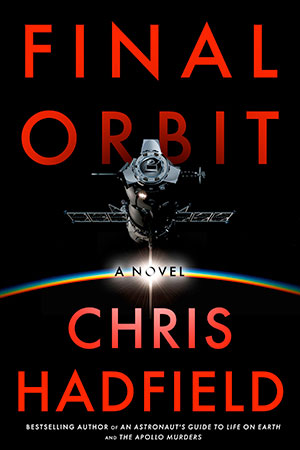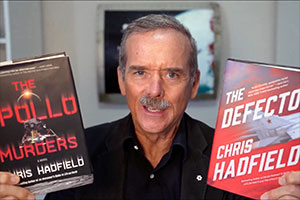October 6, 2025 — Astronaut Chris Hadfield is having a really good time rewriting space history.
In his latest novel, "Final Orbit," which hits store shelves on Tuesday (Oct. 7), Hadfield reaches back 50 years to the space missions of the 1970s. Only in his take, some of the events unfold dramatically different.
For starters, there is a deadly accident during the Apollo-Soyuz Test Project and the U.S. and Russia are not the only countries with astronauts in space.
That is not to suggest that Hadfield's alternate timeline is not grounded in reality. As a former fighter pilot, engineer and Canadian Space Agency space shuttle mission specialist and International Space Station commander, Hadfield is more than familiar with what preceded his own achievements in Earth orbit, as well as the technology and techniques needed for them to happen.
Rather, he has used "Final Orbit" and the two earlier books in his "Apollo Murders" series, to weave in other historic details by altering the major events.
"I really enjoy writing fiction because you can put in all of the interesting stuff — all of the cool details that people always ask me about that if I was writing a non-fiction book I would want to include — but you can then just make it part of the story," said Hadfield in an interview with collectSPACE. "You can talk about it from different astronaut's perspective, from someone who has a whole different way of telling the story than I would, or two different people looking at the same event."
"It gives me a lot more freedom, which I really enjoy," he said.
collectSPACE (cS) spoke with Hadfield about writing "Final Orbit" and how he went about fitting his fictional characters into the real space race. The conversation was kept mostly spoiler-free, citing little more than the description on back of the book discloses, but includes spoiler warnings where appropriate.
cS: Where does "Final Orbit" fit into the timeline of the actual space race? What should readers expect to be the framing events of this story?
Hadfield: This is the summer of 1975 when President Gerald Ford had two assassination attempts on him and Skylab, the first great American space station, had been essentially abandoned and was now sort of derelict in orbit.
There was also an attempt to use space as an inspirational counterweight to the Cold War and show that the Soviets and the Americans could peacefully cooperate in a public way with the Apollo-Soyuz mission. There had been lots of talk about what to actually do with that mission, beyond just simply take an Apollo capsule and dock it with a Soyuz capsule and demonstrate goodwill globally.
All of those things were happening simultaneously, but I took those various threads and unraveled it all in "Final Orbit."
cS: How much of the story is inspired by space history and is any of it influenced by current events? The inclusion of more than just the Soviet and Americans in space feels more current than past. (Warning: spoilers.)
Hadfield: What I was delighted by was the almost unknown depth and breadth and maturity of the Chinese space program in the early '70s.
They had built picket ships to go and relay their communications all around the world. They did a full astronaut selection and brought them in for training, separated from their families for a year. They built an entire biomedical Institute in order to do all of the research.
They built and launched their first rocket in the early 70s. They were in a big hurry to try and get a capsule that could be returned for bringing back spy film, but also to be able to grow that capsule, so that they could then fly a vehicle large enough to fly a person and, in fact, they had the early designs of that human-rated space vehicle.
So all of that is real, and in fact, almost everything in "Final Orbit" is real. I just answered what if [then-Chairman of the Chinese Communist Party] Mao hadn't put their program on hold in '73 and what if he had continued it at the pace that it was going and then what if something had gone wrong on Apollo-Soyuz. What would they have done?
I had to adjust the orbit of Apollo-Soyuz by less than a degree just to make it work to go to Skylab, but I figured that was one of the small amounts of poetic license I could ask readers to accept.
It was so much fun making this essentially, completely real. I was good friends with [cosmonaut] Alexei Leonov and I worked with [flight director] Glynn Lunney and a lot of the other characters. I talked to a lot of the Apollo guys and early shuttle guys. I spent a lot of time with Bob Crippen, as well, because I've known Crip since the early 90s and and he was on the support crew and a backup crew for some of this. He had done lots of Skylab training and Apollo-Soyuz mission support as a capcom [capsule communicator in Mission Control].
So much of it is real. The attempts on Ford's life, which would seem very improbable to have two women assassins — if you made that up, everyone would think, 'well, that's stupid and not credible,' but that's what actually happened late that summer.
So for me, I tried to get so close to reality, and with the Weather Underground [far-left Marxist militant organization], and the fact that they were regularly bombing federal institutions, it just made complete sense to to build this whole subplot of Chinese government-sanctioned tongs [secret organizations] that because they were working with the Weather Underground, see as a mutually beneficial target Johnson Space Center. It was just delightful working my plot into all of that reality.
(Spoilers over.)
cS: When you do involve people that you know from real, does it ever give you pause before, well, killing them in the book?
Hadfield: The series is called "The Apollo Murders."
But on the flip side of that I was a combat fighter pilot and test pilot and an astronaut. I've had lots of friends die, sometimes just in training and sometimes in the direct line of duty. Death is a part of this business. This isn't a book about accountants or librarians, this is a book about a dangerous business.
I learned a long time ago how to accept the reality of danger and death as being just part of what I chose to do with my life. However, when now putting together circumstances that kill people, what I worked really hard to do was present them well and as true to life as possible.
So while it is a necessary part of a murder mystery, I try to be quite thoughtful when doing so. What I do worry about is when I consult with friends about what's the best way to kill somebody, I hope no one else is reading our emails. (laughs)
cS: "Final Orbit" is your third novel in the series. For the benefit of those who have yet to read the first two books or could use a refresher, can you briefly describe "The Apollo Murders" and "The Defector," without giving away any major spoilers?
Hadfield: "The Apollo Murders" was set during the last voyage to the moon and it being financed partially for military reasons that were classified. The two main heroes get introduced in that book: Kaz Zemeckis, who had been selected as an astronaut and then had a flying accident that put him on the sidelines, and a woman cosmonaut, who ended up through an amazing series of events flying to the moon on board an American ship.
And then there is the huge political intrigue of geopolitics and military, where you have both a civilian and a military purpose for going to the moon and then what do you do with all of that information afterwards — that was "The Apollo Murders."
Then, "The Defector" is while the cosmonauts and astronauts were training for spaceflight and meanwhile, the Yom Kippur War broke out and a Soviet "Foxbat" MiG-25 pilot defected and ended up in Area 51, crossing over with the astronaut training crews and with my main protagonist, Zemeckis. The real gist of "The Defector" plot was why did he actually defect with that MiG-25 and what really happened out in the Nevada proving grounds at Jackass Flats, when he was there with his with his MiG-25.
So there's a continuity of plot, everything is like 95 percent real historical events. Both of my main characters are working their way through their lives and their own careers, and both of those stories lead into "Final Orbit."
cS: Do readers need to first read "The Apollo Murders" and "The Defector" to understand and enjoy "Final Orbit"?
Hadfield: It's hard to judge that as an author, because it's so familiar to me that it feels funny to reintroduce people that I already know so well, but I tried to write "Final Orbit" so that, no, you don't need to read the first or the second book in the "Apollo Murders" series first. And I have had reviewers tell me you can just read "Final Orbit" alone and the whole thing makes sense.
You do get a little more depth by having read the earlier books, so while I don't think you need to do so, I think it is probably a good idea if you're interested in the chronology.
cS: Is "Final Orbit" the last book in an "Apollo Murders" trilogy, or do you plan to continue the series?
Hadfield: I don't want to give anything away yet, but there is still lots of continuing room, based on what has been built so far.
"Final Orbit" by Chris Hadfield is set for release by Mulholland Books on Tuesday, Oct. 7, 2025 at bookstores and online retailers. |
|

Cover art for "Final Orbit," astronaut Chris Hadfield's third book in his "The Apollo Murders" series. (Mulholland Books)

Chris Hadfield, holding up his first two novels, "The Apollo Murders" and "The Defector," which lead into "Final Orbit." (Chris Hadfield) |
